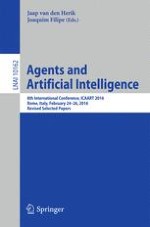2017 | OriginalPaper | Buchkapitel
Discrete Multi-agent Plan Recognition: Recognizing Teams, Goals, and Plans from Action Sequences
verfasst von : Chris Argenta, Jon Doyle
Erschienen in: Agents and Artificial Intelligence
Aktivieren Sie unsere intelligente Suche, um passende Fachinhalte oder Patente zu finden.
Wählen Sie Textabschnitte aus um mit Künstlicher Intelligenz passenden Patente zu finden. powered by
Markieren Sie Textabschnitte, um KI-gestützt weitere passende Inhalte zu finden. powered by
